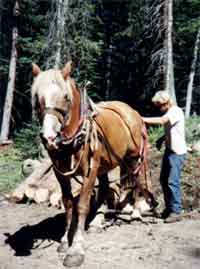Chris Johnson is walking through the spruce-fir forest in Grand Mesa-Uncompahgre National Forest in western Colorado. Whip-thin and blond as a teenager, the 46-year-old wields his chainsaw as if it were a feather duster, touching it to the limbs that are in his way. They fall behind him.

Photo: Lisa Jones.
He’s cutting a trail. At the end of the day, he and his Belgian mare Ruby will use this trail to drag out the logs he’s about to cut.
He nods at a scraggly tree with a broken-off top. “If this was a big corporate tree farm, we’d have to cut that to make room for a high-dollar tree,” he says. “But it’s just standing there. It isn’t hurting anything. The birds might like it, so I’m going to leave it.”
Chris Johnson isn’t the kind of person you’d expect to worry about birds. He’s a guy with an old motorcycle and an intimate knowledge of the workings of a .357. But in his years working with a chainsaw, he’s thought about the forest plenty. “Trees are like love and applesauce in this country,” he says. “We waste ’em.” So he practices his own brand of environmentalism, which means he’s simply careful in his work. He lines his skidding trail with “bumpers” — downed logs that protect standing trees from being gashed by Ruby or the logs she’ll drag out. He rearranges disturbed soil so water doesn’t flow the wrong way and cause erosion. If he sees a porcupine or a bird’s nest in the canopy of the forest, he steers clear. And he tries to sell his lumber to people building environmentally sensitive homes.
“In some ways I think I’m doing something a little bit alternative,” he says, putting a pinch of Copenhagen into his cheek. “In another way I’m revolted by it. I love to work, but I dislike business. Ideally, I’d just be following the buffalo on horseback.”
In 1970, when Chris was 16, his writer father moved his wife and three sons from New York City to a little farm outside Mora, New Mexico. Although Chris got caught in the tensions between the Spanish old-timers and the Anglo newcomers plenty, he admired the locals and soon began working for Marcelino Hererra, a horse logger who paid him $12 a day. Later he worked for Marcelino’s son, Lorenzo.
“Lorenzo was the kind of person who’d walk into someone’s house and know if the plants needed to be watered,” says Chris. “He’d never run his horses too hard. He logged kind of like a pool player shoots pool. He’d say, ‘Let’s not even break a fingernail.’ In everything from parking the truck to felling the trees, he’d try to be super-efficient.”
In the 10 years Chris spent logging in New Mexico, things changed drastically. “When I started, at least half the loggers were using horses. By the time I left there were none at all; it was all being done with big equipment.” When he moved to Paonia, Colo., 14 years ago, he had to adjust to two things: speaking English and not carrying a gun.
It’s time to hitch up Ruby, who has spent the morning eating oats under the trees. With big dark eyes and satiny buckskin hide, she is a beauty. Her harness is attached to a pair of spiked tongs which Chris drops onto the logs. She lunges forward. Sometimes the tongs skip off the log and Chris has to back her up again, which appears about as easy as getting the Colorado River to flow upstream. But they usually bite into the bark and Ruby, all 1,700 finely muscled pounds of her, churns through the forest, the log snaking behind her. Chris lopes along behind.
This happens 23 times, and Chris loads the logs onto the truck. He’ll make around $300 for the day’s work. “But that’s before I pay for gas and repairs,” he says as the truck roars its way up the muddy road. “Other days it’ll rain. And I’ll come up and feed the horse and maybe do some cutting. Other days the clutch’ll go out on the way home, and then I have to pay for parts.”
He double clutches and the truck makes a monstrous, heaving groan. “As long as you get out intact, you’re batting a thousand, and that’s the truth.”
